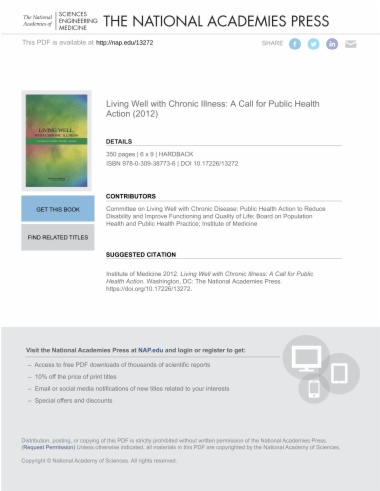

In the United States, chronic diseases currently account for 70 percent of all deaths, and close to 48 million Americans report a disability related to a chronic condition. Today, about one in four Americans have multiple diseases and the prevalence and burden of chronic disease in the elderly and racial/ethnic minorities are notably disproportionate. Chronic disease has now emerged as a major public health problem and it threatens not only population health, but our social and economic welfare.
Living Well with Chronic Disease identifies the population-based public health actions that can help reduce disability and improve functioning and quality of life among individuals who are at risk of developing a chronic disease and those with one or more diseases. The book recommends that all major federally funded programmatic and research initiatives in health include an evaluation on health-related quality of life and functional status. Also, the book recommends increasing support for implementation research on how to disseminate effective longterm lifestyle interventions in community-based settings that improve living well with chronic disease.
Living Well with Chronic Disease uses three frameworks and considers diseases such as heart disease and stroke, diabetes, depression, and respiratory problems. The book's recommendations will inform policy makers concerned with health reform in public- and private-sectors and also managers of communitybased and public-health intervention programs, private and public research funders, and patients living with one or more chronic conditions.